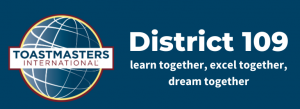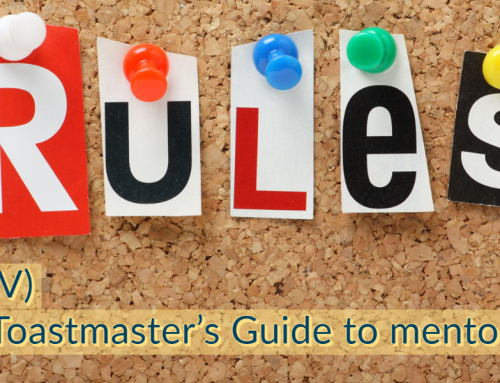Choose the right Mentee.
Not for everybody: How to choose the right mentee
by Lukas Liebich
Becoming a desired mentor is great. You enjoy the respect of your fellow Toastmasters. Meeting and event organizers often ask you to speak, which helps you improve your skills even more. And people seek you out, asking you to mentor them.
Possible problem: There’s only a limited amount of people you can mentor.
Enthusiasm is not enough.
The most rewarding mentoring relationships are with mentees who are proactive, motivated, and committed to learning. But how to identify such characteristics in the people who want you to be their mentor?
You can try just asking them. The problem is that people can be overly optimistic about their ability to dedicate time to learning a particular new skill (such as public speaking in Toastmasters) or accomplishing a goal (such as becoming a Division Director).
I know what I’m talking about. On January 1st, 2022, I set “writing a book” as one of my goals for the year. As I’m writing this article, it’s mid-March already – and I wrote just a single short story. Less than 10% of a book, and even that is just a draft! The reason? I gave priority to learning about facilitating workshops. These days, that’s where I spend almost all my free time, and so that’s where I make progress.
Will I be able to catch up with my writing plan later in the year? That’s unlikely. Even less time for writing! As it turns out, on April 1st, I will begin my term as Region Advisor for Toastmasters in Europe.
The book is not going to happen. At least not this year.
I’m telling you this to illustrate that even someone who is genuinely enthusiastic about the possibilities life (and Toastmasters) offers them may realize that they want to dedicate their time to something else.
Proof, not promises
Maybe you’ll remember a 90’s Old Spice TV commercial with the tagline: “Proof, not promises.” Here’s a link to one of them on YouTube (poor audio quality – but a fun 90’s throwback).
Once you find yourself in a place where you have more people asking you to mentor them than you can responsibly handle, I suggest you treat the selection of your future mentees a little bit like a job interview.
No, I don’t mean that you should grill anyone with tough questions. But same as in a job interview, you have more than one candidate for one job/mentee spot. While in a job interview, you’re looking for proof of skill; with your mentee, you can look for proof of their ability to invest their time into themselves before you invest yours.
A simple thing that works for me is: “I can’t promise you are mentoring right now. But if you deliver six speeches in 3 months, I will mentor you.”
In the second half of 2021, 5 different people asked me to mentor them. When I gave them the condition above, two said they would think about it; three said they would give it a try. 2 of those completed the assignment (6 speeches in 3 months), and we started six months of mentoring in January.
I won’t go into the details here, but what I would like to highlight here is that one of the two who completed the assignment later told me: “Lukas, the mentoring was extremely useful before it even started. I had to push myself to deliver those speeches during such a short time. But I learned a lot. It was worth it.” The second one shared something similar, in different words.
Is it okay to be picky?
I know that “choosing” a mentee might sound tough. But in reality, it will happen either way. If you don’t have any conditions, you will accept the person who asks you first and reject the person who asks you second (or third, or fourth, if you can mentor multiple people).
Giving your “possible mentees” a challenging assignment will benefit everyone who completes it. And it will help you decide to whom you can commit your time.
That is what mentoring is about – committing your time to help someone.
When it comes to making commitments – it is okay to be picky.
Choose the Right Mentee
Click for previous articles:
Busy Toastmaster’s Guide to Mentoring
Before it all starts: How to be a desired mentor?
![]()








